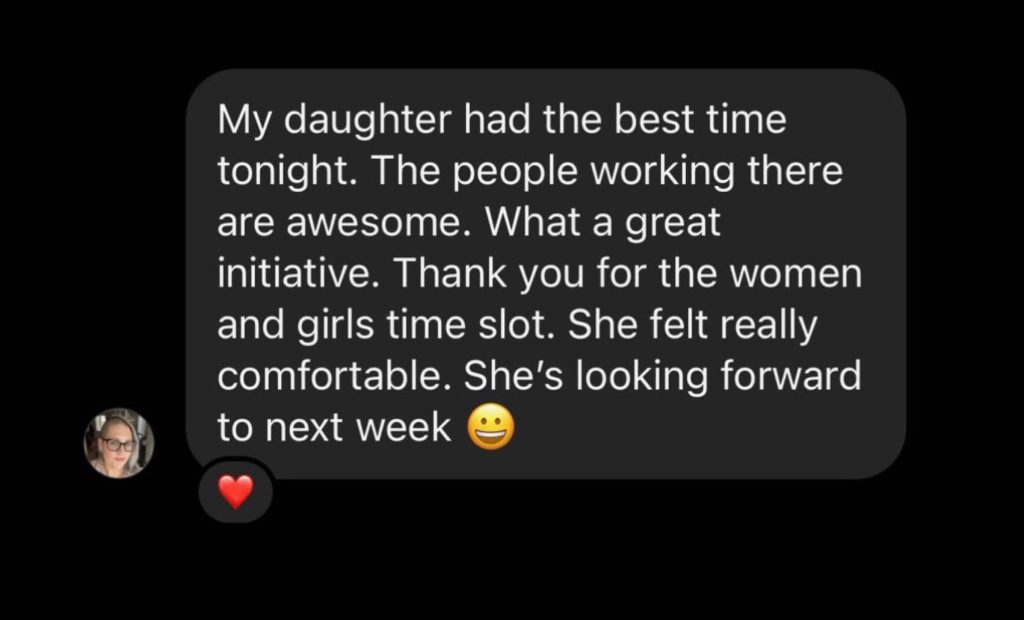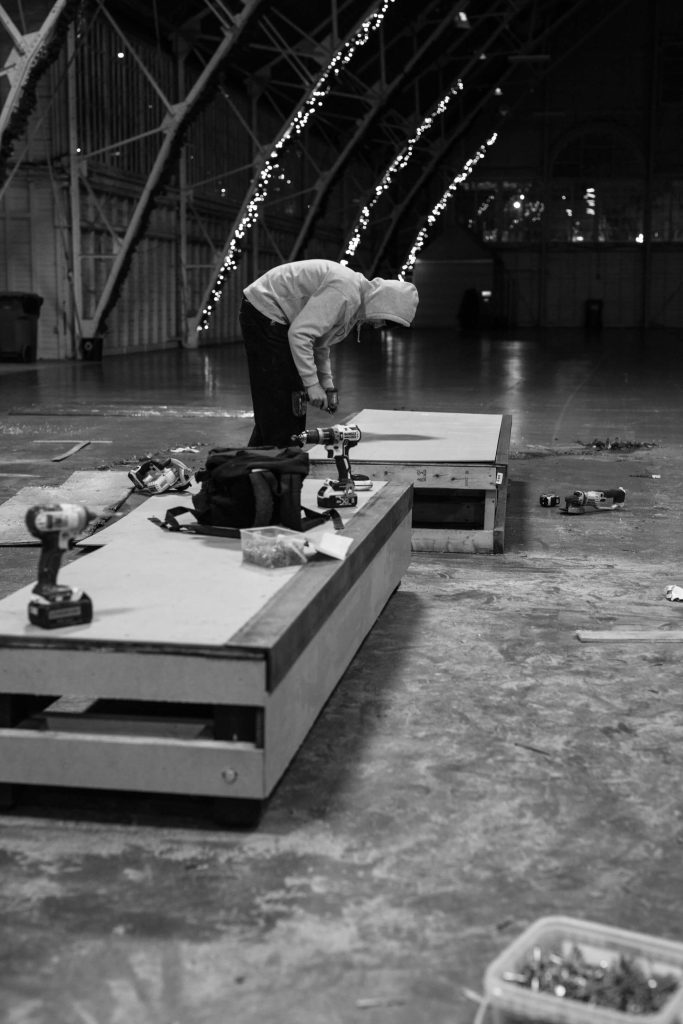Lansdowne Indoor Skateboard Sessions

Building a skateboard community during the harsh Canadian winter
It’s -15ºC and snowing in Ottawa. The sound of laughter and constant thuds fills in the heritage space. Wet winter boots are soaking against the building’s structure.
On one side, parents and children are learning a new sport together. On the other, impressive tricks are done around wooden obstacles manufactured just some weeks prior. We see people from all countries, all walks of life and identities. “It’s so cool and I love coming here. There’s this sense of community and I feel energized in this building”, says a brand-new friend of mine.
The building, the historical and influential Aberdeen Pavillion, erected in 1898 in Ottawa, and originally built for agricultural shows, now hosts a new impressive skill challenge: Skateboarding.


Skateboarding during the frigid Ottawa winter? Really?
Starting in 2022, Ottawa now has a free, heated and dry space for the practice of skateboarding during the winter months. It’s a simple project: an empty space that can accommodate wooden obstacles donated by the community or put together some weeks before by volunteers. Entrance is by reservation in 1h time slots, and skaters should bring a fresh pair of shoes to change at the spot. The project was organized by volunteers in conjunction with the City of Ottawa.
It has been an astounding success.
During this season, this supervised environment that was created was the only viable resource that is accessible to almost anyone during a season where this sport is almost inaccessible. Having an area that is free for use allows there to be one less barrier discouraging someone from picking up the sport (…).
Anonymous feedback collected from our survey



The pressure for winter spaces
As humans, we need places for play and Canada as a whole lacks indoor skateboarding spaces for the winter months. We can even see this represented in the olympic skateboarding series by CBC Sports.
In Ottawa, we see skaters flocking to indoor parking lots at shopping malls and universities (only to be kicked out after a quick session). It’s safe to say that no one likes to skate on a cold, damp and unheated cement building when temperatures are below freezing: most skaters do it due to the lack of suitable places.
With this program, we are reducing this attrition between private buildings and skaters by providing a free and adequate space.
Not only being able to have a warm place with cool obstacles to skate in the winter, but the fact that there was an hour a week where I could skate with mostly girls was amazing and made me really happy, my experiences at the girls only sessions were way better than when I would go to the regular sessions and I really hope this is continued next year.
Anonymous feedback collected from our survey
Putting ourselves in city officials’ shoes
It started with clear communication and patience, a lot of it: The city’s gradual tolerance of indoor skateboarding within their facilities is tied to years of persuasion from the Ottawa Skateboard Association as well as numerous skateboarders and skate shops. Not only we had to communicate the needs and benefits of the program, we had to remain persistent.
City officials are very busy and, understandably, have several concerns about launching these projects based on the lack of knowledge on how this could benefit the community, or that skateboards would be destructive to a recreational space.
It was our job to sell the idea, explain the benefits and why some concerns are unfounded by using trustworthy studies and statistics (for example: comparing hockey injuries vs skateboarding injuries, showing similar programs from other cities…). The whole process from our first emails with the city to the project’s first launch was about 10 months.
At the end of the day, the city of Ottawa listened and agreed, handling all of the logistics (fees, insurance, location, staffing etc.).
I find, historically, my mental health is usually always lower during winter months, but this was probably the first winter of my life that I didn’t feel that same dread, and not to sound sappy, I think it’s because of this program. It kept me active and it kept me social.
Anonymous feedback collected from our survey




The modular layout: Making something temporary that remains interesting for all levels.
Permanent indoor skateparks in Canada often fail because demand is only present when there is snow on the ground. Therefore we understood the need for a temporary multi-use space that would be shared and modified for other sports and events as needed.
Like Lego pieces, small skate obstacles also can be rearranged in different layouts, creating different paths and challenges, even allowing stacking them on top of each other. These obstacles were easy to store during the summer months and easy to push away to open the space for other events. It was all about working and adapting the space that was available and not demanding a special space.
Having an area that is free for use allows there to be one less barrier discouraging someone from picking up the sport. I believe representation and accessibility are two of the main important factors when it comes to implementing these indoor skate sessions. With accessibility to a free controlled space, and open inclusion to anyone who would want to come to the skate sessions, creates less of a barrier between events and the viability/comfortability of others to show up and participate. (…)
Anonymous feedback collected from our survey








Community hangs and new friends.
On the one hand, the indoor program is a place to practice a sport, on the other, it’s also a community builder. Different from sessions at a skatepark, where some people might be afraid to join due to lack of skill, confidence, or for being in a perceived hostile environment, the indoor program provides a safe controlled space for everyone. Most importantly: it allows you to bump into people you wouldn’t normally bump at your favourite skatepark or skate spot.
It was amazing to see parents teaching their children, groups of families hanging out together, people with the most varied ethnical backgrounds and identities hyping each other up, as countries’ borders, ages and social prejudice were almost non-existent, challenging our perception of difference.
It’s not all perfect though and we still have a long way to go in terms of acceptance, but these sessions were a good snapshot of an ideal contemporary culture.
(…) I believe representation and accessibility are two of the main important factors when it comes to implementing these indoor skate sessions. (…) With representation of a diverse demographic of organizers, participants or support staff, it demonstrates to others that they can as well see themselves in that position and participating in this event. (…) With the encouragement of women in skateboarding, and events that foster open inclusion from diverse participants, it allows the opportunity for others to see themselves in someone and give them the encouragement to find it within themselves to try.
Anonymous feedback collected from our survey


The outstanding success and feedback
The program has been an astounding success, with most sessions completely full and reservation spots being completely booked in the first hours of availability. Lots of social media engagement and praise to the volunteers.
The majority of participants were satisfied with the sessions and location. Parents and children included! People feel safe and go at least once a week, wishing there were more days of it.
Amount of reservations: Reservations accounted for 50% of the attendance (the other half was walk-ins): • January: 1104 • February: 1511 • March: 1307 Total reservations: 3922
At the end of the 2023 season, we conducted an online survey to understand how people were feeling about the program and what we could change.
Apart from a lot of praise, we also found out we needed to improve on several items, such as making our language more inclusive to the 2SLGBTQ+ community, improving our signage, adding more or re-organizing our sessions for women, adding more sessions for beginners, amongst others.

At the end of the day, we have the city of Ottawa to thank for listening and handling all of the logistics and fees for this project. It has been a huge success.
The project’s simplicity is what makes it so awesome and replicable in any city/town with a small indoor recreational space, as all you need to start is an unused indoor flat surface: there are many other examples of similar structures in curling rinks, basketball courts, unused churches, and old supermarkets.
We are no experts, but perhaps sharing some of what we did can help people get their own free municipal indoor skateboarding pilot project going.
All you need is a first push 🛹